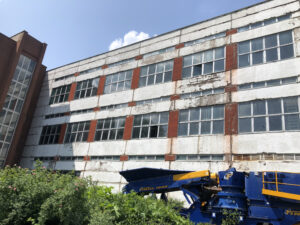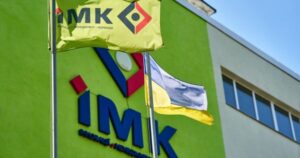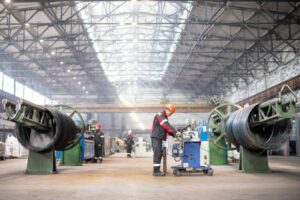
A repeat auction for the privatization of 50%+1 share of PJSC Rivne Radio Technical Plant, which has not been operating since 2013 and has been declared bankrupt, will take place on July 14 at half the initial price of UAH 60.78 million.
According to data in the Prozorro.Prozazhi system, the initial auction scheduled for July 4 did not take place due to a lack of bids. The sale price of the controlling stake (22,423,190 shares) was UAH 121.56 million.
The plant is located 4 km from the M-06 Kyiv-Chop international highway. The balance sheet of the company, which manufactured communications equipment, includes seven real estate properties with a total area of 68,795 square meters. The real estate properties owned by the PJSC are located on a land plot with a total area of 11.38 hectares and are owned by the municipality.
“Among the additional advantages of the asset are its connection to all necessary utilities and the absence of any restrictions on its use. This makes the property an ideal platform for relocation or expansion of existing production,” according to the FGI.
The buyer is obliged to pay off wage arrears and debts to the budget (as of the date of transfer of ownership) within six months, as well as to prevent the dismissal of employees.
According to the FGI, as of March 30, 2025, the company’s overdue accounts payable amounted to UAH 55.21 million, including UAH 12.66 million in wages, UAH 1.9 million in taxes, and UAH 1.17 million in insurance. According to the National Securities and Stock Market Commission (NSSMC), as of the first quarter of 2025, apart from the state, the list of shareholders owning more than 5% of the LLC’s charter capital includes Oleg Maryanchik (5.43% of shares).
The Rivne Radio Technical Plant was once one of the largest enterprises in the region.

During a conference call on May 22, the Board of Directors of agricultural holding IMC approved the payment of interim dividends based on the financial statements as of the end of March this year in the total amount of EUR 22.37 million (EUR 0.63 per share).
The agricultural group published information about the relevant decisions on its website.
IMK noted that when determining the dividends, it was taken into account that net profit for the first quarter of 2025 amounted to EUR 16.74 million, undistributed profit at the end of March was EUR 7.08 million, and issue proceeds were EUR 17.84 million.
Dividends will be paid on June 5 to shareholders as of May 29. Following the announcement of dividends, IMK shares rose by approximately 15%, or PLN4, to PLN31.9 per share (about EUR7.5).
IMK is an integrated group of companies operating in the Sumy, Poltava, and Chernihiv regions (northern and central Ukraine) in the crop production, elevators, and warehousing segments. The land bank is 116,000 hectares, storage capacity is 554,000 tons, and the 2024 harvest is expected to be 864,000 tons.
IMK ended 2024 with a net profit of $54.54 million, compared to a net loss of $21.03 million in 2023. Revenue increased by 52% to $211.29 million, gross profit quadrupled to $109.10 million, and normalized EBITDA increased 25-fold to $86.11 million.

Shareholders of PrJSC “Production Association ‘Stalkanat’ (Odessa) once again intend to allocate UAH 60,511,837 thousand for the payment of dividends at a rate of UAH 0.58 per share from the profit for 2024.
The relevant issue has been included in the agenda of the extraordinary general meeting of shareholders scheduled for June 11 this year in remote mode.
According to the draft decision, which was reviewed by Interfax-Ukraine, it is planned to pay dividends from part of the net profit for 2024 in the amount of 60 million 511 thousand 836.74 UAH, calculated at 0.29 UAH per share, through direct payment to shareholders.
The deadline for dividend payments is December 11, 2025. Payments will be made directly to shareholders’ accounts.
Earlier, Stalkanat shareholders included this issue on the agenda of the general meeting of shareholders scheduled for March 10, 2025.
At the same time, the overall profit figures for 2024 are not provided.
Stalkanat is one of the largest manufacturers of steel ropes and reinforcing bars in Eastern Europe and a leader in the production of metal products in Ukraine.
According to the National Securities and Stock Market Service for the fourth quarter of 2024, Davyd Nemirovsky owns 50% of the shares, Anton Mikhalenko owns 23.7%, and Maria Kondratyuk owns 23.1%. Earlier, the company reported that Vitaly Dubovich, a natural person, owned 3.199998% of its shares.
The authorized capital of Stalkanat is currently UAH 17.736 million, with a par value of UAH 0.17 per share.

By October 10, 2025, JSC “Production Enterprise ‘Tekhmash’ (Dnipro) will pay dividends to shareholders for 2024 totaling UAH 5 million from retained earnings.
According to the company’s announcement in the NSSMC disclosure system, the relevant decision was made on April 10 at the general remote shareholders’ meeting.
Dividends will be paid at the rate of UAH 16.667 thousand per share (par value UAH 8).
As reported, in 2023, the company also paid UAH 5 million in dividends from retained earnings.
According to the Clarity Project, last year the company made a net profit of UAH 2.83 million (compared to UAH 0.19 million in 2023), with net income increasing by 35% to UAH 223.4 million.
Retained earnings at the beginning of the year amounted to UAH 66.74 million (UAH 76.13 million a year earlier).
As of the fourth quarter of 2024, 61% of the authorized capital of Tekhmash is owned by its director Oleksandr Kolomoitsyn, and four other individuals own 28% of the shares in total. The authorized capital of the company is UAH 2.4 million.
The main specialization of OP Tekhmash is the installation of technological equipment, pipelines, manufacturing of conveyors (scraper, belt, screw), capacitive equipment, metal structures, and aspiration air ducts.

Transmagistral Insurance Company PrJSC will increase its authorized capital to UAH 248 million through an additional issue of shares worth UAH 200 million.
According to the company’s information posted in the information disclosure system of the National Securities and Stock Market Commission (NSSMC), this decision was made by shareholders at a meeting on November 29, 2024.
The additional share issue will include 20 million shares with a par value of UAH 10.
As reported at the end of January 2024, JSC Ukrtransnafta, the authorized person acting on the basis of the agreement dated 1 November 2023 on the exercise of rights to 89.4977% of shares in IC Transmagistral, announced a public irrevocable offer for all shareholders of the company to purchase their shares. The purchase price of the shares was UAH 17.76 per ordinary share, which corresponds to the estimated value as of November 2023.
Earlier, the National Bank of Ukraine approved the indirect ownership of 92.4059% of the shares of Transmagistral Insurance Company by the state of Ukraine. Prior to that, on January 8, the NBU confirmed that the company’s ownership structure met the transparency requirements.
According to the company’s website, as of April 2024, the company’s shareholders were Ukrtransnafta JSC – 91.992%, Ukrtransnafta Corporate Fund LLC – 2.908%, Primary Trade Union Organization of Ukrtransnafta JSC (Kremenchuk, Poltava), Primary Trade Union Organization of Ukrtransnafta JSC – 2.908%.

Astarta Agro Holding plans to pay dividends for 2023 in the amount of EUR0.5 per share for a total of EUR12.5 million, which is in line with the previous year.
As stated in the company’s announcement on the Warsaw Stock Exchange, the relevant draft decision has been included in the agenda of the shareholders’ meeting to be held in Nicosia (Cyprus) on June 4 this year.
Other issues include: adoption of a new remuneration policy; confirmation of PriceWaterhouseCoopers as auditor for 2023; and instructing the board of directors to elect an auditor for 2024.
As reported, Astarta first paid EUR12.155 million in dividends in June 2021 based on the results of 2020 in the same amount as proposed now – EUR0.5 per share. In the military year of 2022, the company refused to pay them, and then paid them in 2023.
In 2023, Astarta, the largest sugar producer in Ukraine, reduced its net profit by 5.0% to EUR61.9 million, and its EBITDA decreased by 6.1% to EUR145.77 million, while revenue increased by 21.3% to EUR618.93 million.
Astarta CEO Viktor Ivanchik’s family currently owns about 40.66% of the company. Fairfax Financial Holdings is also a major shareholder with 29.91%, and another 2.62% of shares belong to the company itself and were previously bought back as part of a buyback.
Astarta’s shares are currently quoted at PLN26.6 per share (about EUR6.23 per share), while about a year ago, when the dividend decision was approved, the rate was PLN32.80 per share (about EUR7.28 per share).